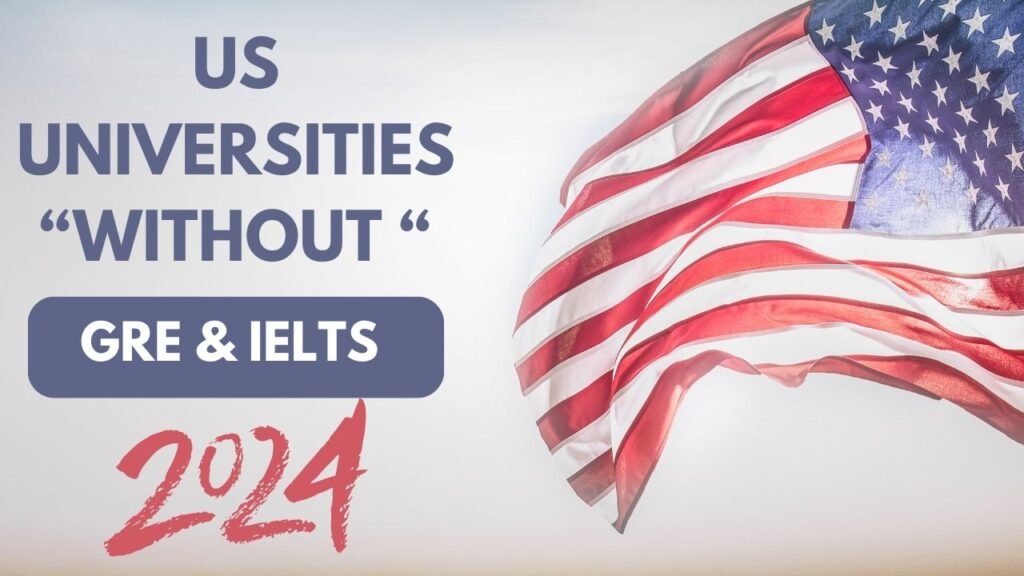
US Universities without GRE and IELTS 2024
In recent times, an evolution in higher education admission requirements has been observed globally, marked by a growing liberalization trend in some US universities. Notably, the traditionally stringent entry exams like the GRE and language competency tests such as the IELTS are undergoing reassessment. This shift aims to attract talented individuals from around the world, prompting a closer look at test-optional policies in US institutions for prospective students.
US Universities without GRE and IELTS 2024
US Universities without GRE and IELTS 2024
US Universities without GRE and IELTS 2024
The Changing Face of Admissions:
Historically, entrance exams like the GRE and IELTS were deemed essential for graduate program applications in the US. However, recognizing the limitations and biases associated with these tests, several universities are now adopting a test-optional policy. This approach allows candidates to submit applications without GRE or IELTS scores, acknowledging that qualitative attributes, professional background, and academic standing can provide a more comprehensive view of a candidate’s talents.
Notable Universities Without GRE Requirements:
- University of California, Berkeley (UC Berkeley):
- Master of Information and Data Science (MIDS) program.
- Emphasis on considering wider academic and professional achievements beyond standardized examination scores.
- Massachusetts Institute of Technology (MIT):
- Master of City Planning program.
- Acknowledges that proficiency on standardized tests is not the sole determinant of success in planning professions.
- University of Chicago:
US Universities without GRE and IELTS 2024
- Master of Arts in Social Work (AM) program.
- Highlights the importance of holistic admissions, considering a candidate’s experiences, history, and character traits.
- University of Arizona:
- Master of Business Administration (MBA) program.
- Encourages candidates to showcase accomplishments, objectives, and professional experiences.
- Purdue University:
- Department of Computer Science Master of Science program.
- Emphasis on assessing candidates based on academic standing, letters of recommendation, and relevant work experience.
Notable Universities Without IELTS Requirements:
US Universities without GRE and IELTS 2024
US Universities without GRE and IELTS 2024
- University of Chicago:
- Master of Arts in Social Work program (for international applicants).
- Exempts international applicants from the IELTS requirement, promoting a diverse and inclusive student body.
- University of Dayton:
- Undergraduate and graduate programs.
- Considers alternative English proficiency tests such as Duolingo English Test or TOEFL.
- Drexel University:
US Universities without GRE and IELTS 2024
- College of Engineering (for overseas applicants).
- Waives the IELTS requirement, considering the applicant’s career and academic history alongside other measures of English proficiency.
- University of Delaware:
- English Language Institute (ELI) programs.
- Offers an alternate route for non-native English speakers to prove language competency.
- University of Houston:
- International applicants may be eligible for an IELTS requirement waiver.
- Conditional on meeting specific requirements like obtaining a certain TOEFL score or completing a degree program in an English-speaking nation.
Benefits of Test-Optional Policies:
- Diversity and Inclusion:
- Encourages diversity by drawing candidates from diverse backgrounds, experiences, and viewpoints, fostering collaboration and improving the academic environment.
- Reduced Stress for Applicants:
- Alleviates stress for applicants who struggle with standardized testing conditions or demonstrating English competence.
- Focus on Holistic Evaluation:
- Promotes a comprehensive approach to admissions, considering personal traits, professional experiences, letters of recommendation, and academic accomplishments for a more thorough understanding of a person’s potential.
- Global Accessibility:
- Increases accessibility for foreign students, allowing a broader range of individuals to pursue higher education in the US by eliminating stringent examination requirements, fostering scholarly and cultural interactions.
Challenges and Criticisms:
- Perceived Lack of Objectivity:
- Critics argue that standardized exams offer an impartial assessment of intellectual aptitude, expressing concerns about potential bias in holistic evaluations and questioning the objectivity of admissions decisions without standardized measurements.
- Impact on Rankings:
- Test-optional policies may impact university rankings, as these rankings often consider elements like the average GRE score of admitted students. Some universities might be hesitant to fully embrace test-optional admissions due to concerns about their position in national and international rankings.
Conclusion:
The landscape of American higher education is evolving as institutions reevaluate standardized testing and language competence assessments in admissions. Test-optional regulations at several colleges underscore their commitment to diversity, inclusivity, and a more holistic application examination. This shift allows prospective students to focus on academic and career goals without the stress of standardized testing, though it is crucial for applicants to research and understand each university’s specific policy, as some institutions have not entirely abandoned these requirements. As the admissions debate continues, universities are recognizing the significance of evaluating candidates using a broader set of parameters, marking a positive step towards making education more accessible and equitable for diverse learners.